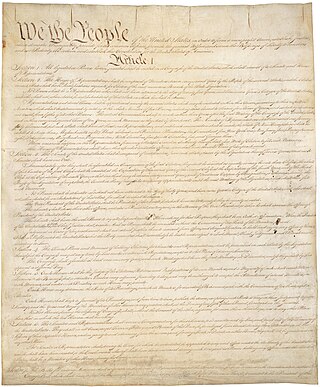
Article Five of the United States Constitution describes the procedure for altering the Constitution. Under Article Five, the process to alter the Constitution consists of proposing an amendment or amendments, and subsequent ratification.

The Constitution of the State of Vermont is the fundamental body of law of the U.S. state of Vermont, describing and framing its government. It was adopted in 1793 following Vermont's admission to the Union in 1791 and is largely based upon the 1777 Constitution of the Vermont Republic which was drafted at Windsor in the Old Constitution House and amended in 1786. At 8,295 words, it is the shortest U.S. state constitution. Largely unchanged since 1777, Vermont's Constitution is the only active constitutional document to have been drafted and ratified outside of the United States.

The Twenty-third Amendment to the United States Constitution extends the right to participate in presidential elections to the District of Columbia. The amendment grants to the district electors in the Electoral College, as though it were a state, though the district can never have more electors than the least-populous state. How the electors are appointed is to be determined by Congress. The Twenty-third Amendment was proposed by the 86th Congress on June 16, 1960; it was ratified by the requisite number of states on March 29, 1961.
A constitutional amendment is a modification of the constitution of a polity, organization or other type of entity. Amendments are often interwoven into the relevant sections of an existing constitution, directly altering the text. Conversely, they can be appended to the constitution as supplemental additions, thus changing the frame of government without altering the existing text of the document.

The Connecticut Compromise, also known as the Great Compromise of 1787 or Sherman Compromise, was an agreement reached during the Constitutional Convention of 1787 that in part defined the legislative structure and representation each state would have under the United States Constitution. It retained the bicameral legislature as proposed by Roger Sherman, along with proportional representation of the states in the lower house or House of Representatives, and it required the upper house or Senate to be weighted equally among the states; each state would have two members in the Senate.

The United States Constitution has served as the supreme law of the United States since taking effect in 1789. The document was written at the 1787 Philadelphia Convention and was ratified through a series of state conventions held in 1787 and 1788. Since 1789, the Constitution has been amended twenty-seven times; particularly important amendments include the ten amendments of the United States Bill of Rights and the three Reconstruction Amendments.

The District of Columbia Voting Rights Amendment was a proposed amendment to the United States Constitution that would have given the District of Columbia full representation in the United States Congress, full representation in the Electoral College system, and full participation in the process by which the Constitution is amended. It would have also repealed the Twenty-third Amendment, which granted the District of Columbia the same number of electoral votes as that of the least populous state, but gave it no role in contingent elections.

Voting rights of citizens in the District of Columbia differ from the rights of citizens in the 50 U.S. states. The United States Constitution grants each state voting representation in both houses of the United States Congress. It defines the federal district as being outside of any state, and does not grant it any voting representation in Congress. The Constitution grants Congress exclusive jurisdiction over the District in "all cases whatsoever".
A convention to propose amendments to the United States Constitution, also referred to as an Article V Convention, state convention, or amendatory convention is one of two methods authorized by Article Five of the United States Constitution whereby amendments to the United States Constitution may be proposed: on the Application of two thirds of the State legislatures the Congress shall call a convention for proposing amendments, which become law only after ratification by three-fourths of the states. The Article V convention method has never been used; but 33 amendments have been proposed by the other method, a two-thirds vote in both houses of Congress; and 27 of these have been ratified by three-fourths of the States. Although there has never been a federal constitutional convention since the original one, at the state level more than 230 constitutional conventions have assembled in the United States.

A convention, in the sense of a meeting, is a gathering of individuals who meet at an arranged place and time in order to discuss or engage in some common interest. The most common conventions are based upon industry, profession, and fandom. Trade conventions typically focus on a particular industry or industry segment, and feature keynote speakers, vendor displays, and other information and activities of interest to the event organizers and attendees. Professional conventions focus on issues of concern along with advancements related to the profession. Such conventions are generally organized by societies or communities dedicated to promotion of the topic of interest. Fan conventions usually feature displays, shows, and sales based on pop culture and guest celebrities. Science fiction conventions traditionally partake of the nature of both professional conventions and fan conventions, with the balance varying from one to another. Conventions also exist for various hobbies, such as gaming or model railroads.

The Congressional Apportionment Amendment is a proposed amendment to the United States Constitution that addresses the number of seats in the House of Representatives. It was proposed by Congress on September 25, 1789, but was never ratified by the requisite number of state legislatures. As Congress did not set a time limit for its ratification, the Congressional Apportionment Amendment is still pending before the states. As of 2024, it is one of six unratified amendments.
Electoral reform in the United States refers to efforts to change American elections and the electoral system used in the United States.
The calling of a Second Constitutional Convention of the United States is a proposal made by some academics and activists from across the political spectrum for the purpose of making substantive reforms to the federal government of the United States by rewriting the U.S. Constitution.
Rootstrikers is a nonpartisan grassroots activist organization run by Demand Progress and created by Harvard Law School professor Lawrence Lessig and political activist Joe Trippi for the purpose of fighting political corruption in the United States and reducing the role of special interest money in elections. According to Lessig, the idea is not to hack at the branches of the problem but rather focus on its root, which Lessig views as a corrupt campaign finance system, and hence he named the organization rootstrikers.

One Way Forward: The Outsider's Guide to Fixing the Republic is the seventh book by Lawrence Lessig, a Harvard law professor and activist concerned about the excessive influence of corporate money in politics. One Way Forward describes his discussions with activists in the Tea Party and Occupy Wall Street. He says the two groups have a lot in common, including a concern for the future of the US and a willingness to devote substantial amounts of time and possibly money to do what they think is likely to fix the worst of the problems.

Wolf-PAC is an American nonpartisan political action committee formed in 2011 with the goal of adding an "amendment to the United States Constitution to ensure balance, integrity, and transparency to our national system of campaign finance".

The 2016 presidential campaign of Lawrence Lessig, a law professor at Harvard University and cofounder of Creative Commons, was formally announced on September 6, 2015, as Lessig confirmed his intentions to run for the Democratic Party's nomination for President of the United States in 2016. Lessig had promised to run if his exploratory committee raised $1 million by Labor Day, which it accomplished one day early. He described his candidacy as a referendum on campaign finance reform and electoral reform legislation.

The Citizen Equality Act of 2017 is a draft piece of legislation proposed by former 2016 American presidential candidate Lawrence Lessig. The act was the centerpiece of Lessig's campaign platform, encompassing his plans to improve political equality including campaign finance reform, expansion of voting access, and revised districting laws. Lessig had stated that if elected, he would make these reforms the first priority of his presidency. At the start of his campaign, he announced his candidacy as a "referendum," stating that he would step down upon the enactment of the Citizen Equality Act and turn the presidency over to the vice president. In an October 2015 interview on HBO's Real Time with Bill Maher, he retracted this statement and expressed his intention to stay on as president if elected. On November 2, 2015, Lessig ended his bid for the presidency, citing changes in Democratic Party rules that excluded him from the stage during televised debates.
A campaign finance reform amendment refers to any proposed amendment to the United States Constitution to authorize greater restrictions on spending related to political speech, and to overturn Supreme Court rulings which have narrowed such laws under the First Amendment. Several amendments have been filed since Citizens United v. Federal Election Commission and the Occupy movement.










